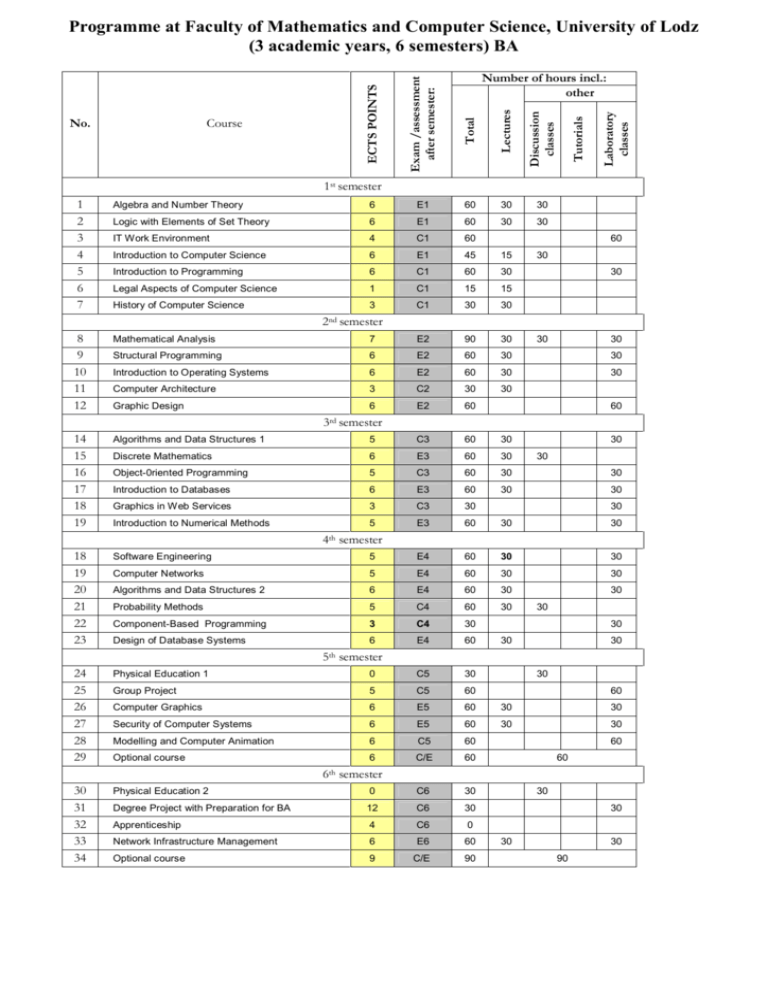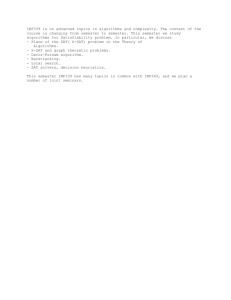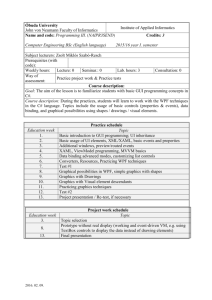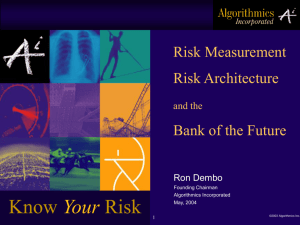BA Computer Science
advertisement

6 E1 60 30 30 Logic with Elements of Set Theory 6 E1 60 30 30 IT Work Environment 4 C1 60 Introduction to Computer Science 6 E1 45 15 30 Introduction to Programming 6 C1 60 30 Legal Aspects of Computer Science 1 C1 15 15 3 C1 30 30 Course Laboratory classes Discussion classes Algebra and Number Theory No. Tutorials Lectures Number of hours incl.: other Total Exam /assessment after semester: ECTS POINTS Programme at Faculty of Mathematics and Computer Science, University of Lodz (3 academic years, 6 semesters) BA 1st semester 1 2 3 4 5 6 7 History of Computer Science 60 30 2nd semester 8 9 10 11 12 Mathematical Analysis 7 E2 90 30 30 30 Structural Programming 6 E2 60 30 30 Introduction to Operating Systems 6 E2 60 30 30 Computer Architecture 3 C2 30 30 Graphic Design 6 E2 60 C3 60 30 60 3rd semester 14 15 16 17 18 19 Algorithms and Data Structures 1 5 Discrete Mathematics 6 E3 60 30 Object-0riented Programming 5 C3 60 30 30 Introduction to Databases 6 E3 60 30 30 Graphics in Web Services 3 C3 30 5 E3 60 30 30 Introduction to Numerical Methods 4th 18 19 20 21 22 23 30 30 30 semester Software Engineering 5 E4 60 30 30 Computer Networks 5 E4 60 30 30 Algorithms and Data Structures 2 6 E4 60 30 30 Probability Methods 5 C4 60 30 Component-Based Programming 3 C4 30 6 E4 60 Design of Database Systems 30 30 30 30 5th semester 24 25 26 27 28 29 Physical Education 1 0 C5 30 Group Project 5 C5 60 Computer Graphics 6 E5 60 30 30 Security of Computer Systems 6 E5 60 30 30 Modelling and Computer Animation 6 C5 60 6 C/E 60 Optional course 30 60 60 60 6th semester 30 31 32 33 34 Physical Education 2 0 C6 30 Degree Project with Preparation for BA 12 C6 30 Apprenticeship 4 C6 0 Network Infrastructure Management 6 E6 60 Optional course 9 C/E 90 30 30 30 30 90 The specialisation in Computer Science contains courses on various aspects and functions of information technology, taught by leading academics as well as practitioners. The specialisation programme consists of five blocks of courses focusing on the following issues: Computer Science 1. (Mathematics and Foundations of Computer Science) This section covers fundamental knowledge about computer science providing mathematical and technological foundations of computer science. The leading themes within this segment include: - number theory, - abstract algebra, - set theory, - precise logic reasoning, - mathematical analysis, - integral and differential calculus, - combinatorics and discrete mathematics, - graph theory, - probability methods and statistics, - history of computing, - computer system architectures, - data representations, - low level programming, - legal aspects of computer science. Computer Science 2. (Algorithmics and Programming) This section ranges over various topics from the field of algorithmics and programming. The leading themes within this segment include: - algorithm analysis, - methods of designing algorithms, - abstract data structures, - sorting, searching and hashing algorithms, - numerical methods, - imperative and procedural programming, - structural programming, - object-oriented programming, - generic programming and multithreading, - component-based and visual programming, - internet applications. Computer Science 3. (Operating Systems and Computer Networks) In this section wide range of topics concerning operating systems and computer networks are presented. The leading themes within this segment include: - fundamentals of operating systems, - management of processes, system resources and file systems, - computer networks and protocols, - computer network addressing and communication, - network topologies and physical technologies, - management of network services, - security of network systems, - cryptographic techniques in computer systems, - management of network and system infrastructure. Computer Science 4. (Database Systems and Software Engineering): This segment is devoted to database systems and software engineering. The leading themes within this segment include: - fundamentals of database technologies, - data modelling and storing, - query languages and database programming, - database optimization methods, - data security, - database administration and tuning, - system development life cycle, - IT project management. Computer Science 5. (Computer Graphics) This segment concentrates on various topics related to computer graphics. The leading themes within this segment include: - mathematical fundamentals of computer graphics, - graphic design, - graphics in internet applications, - graphic modelling, - computer animation.






